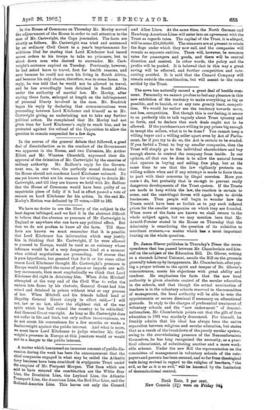The news has naturally caused a great deal of hostile
com- ment. Personally we cannot profess to feel any pleasure in this new exhibition of the tendency to make everything as big as possible, and to banish, or at any rate greatly limit, competi- tion. We would far rather see the tendency towards more, not less, competition. But though this is our feeling, it seems to us perfectly idle to talk vaguely about Trust tyranny and so forth, and to declare that such deals ought not to be allowed. If the purchasersare willing to pay prices big enough to tempt the sellers, what is to be done P You cannot keep a, willing buyer and a willing seller apart even by Act of Parlia- ment, for if you try to do so, the Act is certain to be evaded. If you forbid a Trust to buy up smaller companies, then the Trust will simply go to the individual shareholders and buy enough shares to control the company from inside. In our opinion, all that can be done is to allow the natural forces that operate in buying and selling free play, but at the same time to see that the law vigilantly protects un- willing sellers when and if any attempt is made to force them to part with their concerns by illegal coercion. More you canm t do, but probably that is enough to prevent really dangerous developments of the Trust system. If the Trusts are made to keep within the law, the reaction is certain to come, and the centrifugal forces will again begin to divide businesses. Then people will begin to wonder how the Trusts could have been so foolish as to pay euch inflated prices for the smaller companies on which they are founded. When more of the facts are known we shall return to the whole subject again, but we may mention here that Mr. Arnold-Forster stated in the House on Thursday that the Admiralty is considering the question of its subsidies to merchant cruisers,—a matter which has a most important bearing on the whole question.


























































 Previous page
Previous page